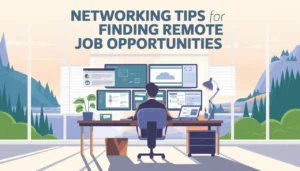Remote Resume Tailoring becoming one of the popular phenomena among people that currently enables individuals to work directly from. Anywhere there is an internet connection. A surge in demand for remote job creation has made it more imperative to update your resume to take the focus on all that you have which would be pertinent to this type of job. Emphasis on independent work, effective communication, and time management will leave your chances for landing a desirable remote-based job to escalate dramatically. How to Write Your Compelling Resume Highlighting Your Remote Work Skills:

Remote Resume Tailoring Work Requirements
Employers who recruit work-from-home employees often seek job applicants with a mix of soft skills and technical skills, along with extreme adaptability and flexibility. This is the winning formula for success in the virtual environment. Workers in the remote setup must be self-driven; that is, they have to be motivated to carry out the work they are assigned to do by their employers. The kinds of soft skills that employers look for in work-from-home jobs include the following.
Communication: The ability to effectively communicate with colleagues and clients.
As much as communication skills are important, they must be effective. In other words, a remote worker should narrate or describe his ideas clearly and briefly, using the written and oral forms of communication. Nobody can imagine working effectively in a virtual setting without knowledge of the tools of virtual communication, such as video conferencing and instant messaging.
Time Management is one of the skills that remote workers will need to have in order to meet deadlines effectively. The candidate should be able to prioritize and sequence tasks, set obtainable goals, as well as struggle against procrastination.
Self-Discipline: Candidates must demonstrate self-discipline in their independent and focused action for the work they are going to perform.
Problem solving: People working at remote locations face certain unique situations requiring them to be creative while solving problems. Working individuals at remote locations will thus, autonomously or seek help when needed, be able to identify and solve their respective problems.
Adaptability: Remote working environments are constantly changing and dynamic. Candidates are expected to be flexible with new situations as well as challenges.
Technical Skills
Proficiency in various remote work tools : Video conferencing suite, project management tools, and cloud-based collaboration platforms.
Technology friendly : The candidates should be comfortable with technology as well as possess basic knowledge of troubleshooting common technical problems.
Internet connectivity: Stable internet access is required for remote work. The candidates should have stable internet connectivity that is sufficient in terms of speed to handle their communication requirements.
Adaptability and flexibility
The work must be independent: This would entail the self-motivation, to work independently without constant supervision.
Flexibility: one should be flexible on changing working hours, work environment, and project requirements.
Resilience : rebounding back from setbacks, deriving the capacity to succeed in remote work.
Quantifying Your Achievements
Achievement quantification would then be made possible through the use of metrics and data that would adequately show your accomplishments and ensure a high possibility of landing a remote job. In this way, you can be ascertained to have concrete skills and experience evidence, making your resume even more attractive to employers.
Examples of Quantifiable Achievements
Sales: “Increased sales by 20% through effective cold calling and building of relationships.”
Cost Reduction: “Reduced operation cost by 15% by introducing new measures on efficiency.”
Efficiency: “Streamlined project management processes reduced the average project turnaround time by 30 percent.”
Customer satisfaction: “Focused on exceptional customer service, with a 95 percent rating.”
Team leadership: “Managed a team of 5 in the launch of the new product and exceeded revenue targets by 25 percent.”
Best Tips for Quantifying Your Experience
Use Concrete Numbers and Measures: Don’t use general conclusions as you end; instead, use concrete numbers and measures to give liftoff to your achievements. For example, instead of stating “increased sales,” say “increase by 20%.”
Results Oriented: The best way of word-of-description on your achievements is to be results oriented. For instance, instead of listing your tasks and responsibilities, say “led a team to the successful accomplishment of a project within time and budget.”
Action Verbs: Use strong action verbs to describe your accomplishments. Instead of “responsible for, achieve, implement, or lead”.
Context: Explain the context of your achievement. For instance, if you increased sales, explain how you got there and what strategies or tactics you employed to achieve that result.
Use of the STAR Method: The STAR method is helpful to structure your accomplishment.
Situation: Share with me the situation or problem you encountered.
Task: Describe your role and your responsibilities.
Action: Share what you did about that situation.
Result: Quantify how well your action led to a good outcome .
Using these tips and presenting metrics and data to help depict your successes, you can generate a very effective resume that helps you land remote jobs.
Highlighting Remote Work Experience
You can specify the experience you have had working from home. This is actually a rather good boast to your claim of remote working credibility and proves you will be able to work successfully and independently in a virtual environment.

Leveraging Existing Remote Work Experience
Measure Your Successes: Use statistics and facts to reflect what you have accomplished in your previous remote roles. For example, if you remotely worked as a customer service representative, then your achievements could be measured in terms of average response time, customer satisfaction ratings, or sales figures.
Be sure to highlight your flexibility: For instance, there may be an easy time you took to adapt to this new technology, how things are done within that setup, or even the way you all communicated with one another. Perhaps, it was the effortless period when you managed to acquire new tools for remote work or how you turned out to become effective in collaboration with team members in different time zones.
Show yourself disciplined: Explain how you kept focused and productive at work even with a minimum level of supervision. This would include: using time management skills, self-setting personal goals, and meeting deadlines.
Ability to work independently and at a distance
It may be difficult to claim an experience working remotely for years, but you can boast about your ability to work independently and away from colleagues. Here’s how:
Highlight the work you have done independently: If you had projects that involved independence such as assignments, research, or personal work, ensure to include them in your resume.
Talk About Your Time Management: Stress your ability to arrange time, prioritize things, and meet up with deadlines without having to be constantly supervised.
Discuss Your Virtual Collaboration Experience: Have you ever participated in an online course, webinar, or virtual team project? Highlight your experience of using virtual collaboration tools, how you will communicate effectively in virtual settings, and how you understand the nuances of virtual collaboration.
Remote Working Projects or Roles Examples
Freelance Writing: Have you been working as a freelance writer? Highlight that you have worked independently, were able to meet timelines, and communicated well with the client.
Online Tutoring: If you have an experience in online tutoring, you can demonstrate the following: work off-site/remote, communicate with students, and manage other types of learners.
Virtual Customer Service: If you have experience as a virtual customer service representative, you might apply some of their skills and be able to demonstrate the ability to answer diverse customer inquiries or concerns that could be dealt with in the remote environment and support high standards of customer service.
Use this if you have been managing remote teams or projects, and you will have experience leading and coordinating teams while working remotely, setting goals, and monitoring progress.
Make sure to effectively use it by pointing out your remote work experience in order to prove that you can work independently and in a remote work setting in order to possibly get that dream job that fits your needs.
Emphasizing Relevant Skills
To really develop your resume to attract the right remote work application, you need to pinpoint the most important skills relevant to the success of remote work. These include effective communication, problem-solving and even project management.
Identify Skills for Success in Remote Work
Virtual Communication: Professionals in remote work must have the right skills involving virtual communication tools including video conference, instant messaging, and emails.
Time Management: How to manage your time effectively so that timely submissions become a norm.
Problem Solving: The specific kinds of problems that remote workers commonly encounter have to be solved creatively.
Adaptability: Adaptation to new situations and challenges is essential to be a successful remote worker.
Self-Discipline: The ability to work with personal motivation and the strength to stay focused and productive without direct supervision.
Technical Skills: Familiarize yourself with the different tools and technologies of remote work.
Tailor Your Resume to Show Evidence of These Skills
Use Keywords: Include keywords for your resume, such as “remote work,” “virtual communication,” “time management,” and “problem solving.”
Provide Examples: Use vivid examples of your skills. For example, if you have high knowledge in virtual communication, you could describe how you once led a virtual meeting or were part of a remote team and how the virtual collaboration was effective.
Quantify Your Skills/Achievements: With metrics and data, quantify your skills and achievements. For example, you could point out how you meet deadlines by mentioning your on-time rate at completing projects.
Relevant Certifications: In case you have remote work, certifications or even project management, do not forget to include them on your resume.
Examples of Relevant Skills
Virtual Communication: I have the video conferencing software; I possess good instant messaging, or email, communication with a remote team.
Time Management: I have a high level of competence in prioritizing tasks, establishing proper deadlines, and effectively managing time according to project goals.
Problem-Solving: I can identify and solve my problems independently with the proper technique of creative problem solving.
Adaptability: This is the capacity to learn fast and adapt quickly to new technologies, processes, and challenges of remote working.
Self-Discipline: So strongly motivated, able to work independently, and without direct supervision, highly shows themselves capable of staying focused and productive.
Technical Competency: Application of remote work tools; to include project management software, cloud-based collaborative platforms, and video conferencing applications.
All these skills can be enlightened to make it evident that you can work remotely and thus, increase the odds of getting your dream job.
Creating a Strong Remote Work Summary
It will make a lot of difference in your resume if you present a summary that gives a snapshot of your qualifications and experience. When getting ready to draft resumes for remote job applications, you should therefore create a summary that reflects your potential for remote work and is also filled with words relevant to the remote job.
How to Write a Great Summary
Important Skills Identify related skills and characteristics that qualify you as a great candidate for telecommuting opportunities. You can mention your self-sufficiency, clear communication, or ability to work on your own.
Experience – Indicate the relevant experience you have achieved. Strive to mention only your achievements along with measurable results.
Use Keywords: Use keywords on remote work, such as “remote work,” “work from home,” “virtual communication,” and “time management.” In this way, when the company searches using the keyword, your resume will appear.
Short Summary: Aide to a summary that is not overly long but can fit into three sentences or less. The shorter it is, the greater the opportunity that someone might read it and remember it.
Using Keywords for Remote Jobs
Keyword Remote Work: This keyword explicitly shows that you want remote work.
Work from Home: This keyword is often used interchangeably with “remote work.”
Virtual Communication: Stress that you are conversant with the virtual tools you use to communicate.
Time Management: Stress the fact that you are an achiever in time management and prompt in meeting deadlines.
Independent Work: Do prove that you can work alone, independent, and that you take initiative.
Adaptability: Show that you can adapt to any situation that comes your way.
Examples of Good Remote Work Resume Summaries
Example 1: “Results-oriented home-based professional with more than 5 years of experience in [industry]. Has demonstrated ability to work independently, manage projects with results, and effectively communicate transparently in virtual teams. Key competencies include [appropriate skills, such as project management, customer service, data analysis].
Example: “Motivated high achiever, remote worker who seeks a challenging role in [industry]. Focused in fast-pacing environments with strong productivity and the ability to thrive in remote work. Results-oriented; quality results delivered. Highly skilled in virtual communications, time management, problem-solving skills.”.
Crafting the pitch and using all the right terms when pitching for a potential online job will surely give you many chances of getting that kind of attention and landing your ideal remote job.
Tailoring Your Resume to Specific Job Descriptions
Tailor your resume for every single job posting to get a remote job. That calls for critically analyzing the job description in terms of its requirements and highlighting qualifications for each one of them.

Analyzing Job Postings
Identify Key Requirements: Carefully read the job description and identify the most important skills, qualifications, and experience required for the position.
Keywords and phrases: Be alert to specific keywords or phrases in the job description, which an employer may use in filtering a resume.
Know the company’s culture: Understand your company’s culture and values so that your resume fits in their expectations.
Resume Tailoring
Relevant Keywords: Use relevant keywords discovered from the job description in your resume, especially in the summary, skills, and experience sections.
Highlight Relevant Experience: Highlight such experiences as closely related to the needs of your job.
Measure Your Successes: Use measures and quantifiable approaches to present your achievements and how these feature in relation to meeting the needs or requirements of the specific job you are applying for.
Tailor Your Summary: Tailor your summary to refer to specific needs and requirements of the job.
Best Practices Using Keywords Helpful
Use Keywords Naturally: Avoid keyword overuse as this should then make your resume look unnatural and spammy.
Location of Keywords: Emphasize your keywords in the summary, skills section, experience section, and anywhere else it applies to your resume.
Keyword Variations: In some instances you can use the synonyms or related terms. In this case, you don’t want to repeat the same keyword several times.
Keyword Research Tools: You can use various online tools when figuring out which keywords have to do with a particular industry or job that you’re targeting.
Careful analysis of the job and tailoring the resume to match specific requirements will give you very good chance to get a remote job opportunity. Remember, a well-crafted resume that showcases qualifications and aligns with the needs of the employer is what one needs in a highly competitive job market today.
Additional Tips for Remote Job Applications
In addition to the above tailoring of your resume, there are several other strategies that will build your chances of landing a remote job. Among the strategies include building a robust online presence, preparing for virtual interviews, and networking with other remote workers.
Building a Strong Online Presence
LinkedIn Profile: Set up your LinkedIn profile professionally with all your skills, experience, and accomplishments. Use keywords that relate to the remote work industry to help your profile gain more visibility.
Personal Website: Consider creating a personal website or portfolio to display all your work, illustrating all of the skills that you bring.
Online Portfolio: If you operate in an art-driven industry, for instance, you probably will want to consider creating an online portfolio so you can share all of your projects and your work samples.
Video Conferencing Practice: Find out the video conferencing application that is going to be used in the interview, and practice it before the interview.
Dress Professionally: Even though you are interviewing from home, do remember to dress professionally.
Questions to the Interviewer: Prepare the right kind of thoughtful questions to ask the interviewer about the company and role as well as the culture of remote work.
Your Technology Test: Make sure your internet connection, camera, and microphone are all working well before your interview.
Networking with Other Remote Workers
Joining Online Communities: Participate in online forums, groups, and communities related to remote work.
Attend Virtual Events : Attend virtual conferences, webinars, and meetups, which might get you connected to other remote workers.
Reach out to Remote Professionals: Connect to remote professionals in your industry via LinkedIn or social media.
Furthermore, with these added tips, it is quite easy to enhance your job search in acquiring a fulfilling remote job. Persistence and a proactive approach are key ingredients to success in the world of remote work, which is indeed competitive.
Conclusion
Customize your resume-for today’s trend in job hunting is a remote job. Tailor your resume to let people know how you can contribute to a remote working team, and that will increase your chances of getting such a fulfilling remote career.
Also, one should not forget working experience to be measured and to count remote work experience as a plus, skills relevant to the post to focus on, and maybe online presence will add a little difference. With these recommendations, preparation for virtual interviews and creating one’s network with other remote workers while job hunting will surely prove to be useful.
More importantly, a successful remote career delivers an entire array of benefits, such as flexibility and work-life balance. A person can be located in any corner of the world if there is an internet connection. By taking the time and making the effort to customize a resume and prepare for successful remote job applications, a person will land in the best position for an extremely rewarding and fulfilling remote work experience.
Additional Considerations
Further flavor on the text of the blog post could be achieved by adding the following:
Examples of Engaging Resumes Designed for Remote Work
Provide concrete illustrations of resumes that have been customized to fit remote work applications. These will inspire and provide concrete advice to those readers on the composition and general layout for their resume.
Resumé Template or Checklist To Download
Create a downloadable resume template or checklist that readers can use to prepare their information so that they don’t miss any of the essentials when they’re applying for remote jobs. This will be one of the most important resources on the blog and help readers save themselves time and stress.
Dealing with Frequently Asked Questions
Anticipate the questions that readers might have while going through and respond to it clearly and contentedly. This will alleviate their fear and doubts they may have regarding remote job applications and will give a good lead.
Video Tutorial/Webinar Production
You may also have to create a video tutorial or hold a webinar associated with the blog post. By doing so, you engage the reader and give them an experience that is more dynamic and interactive while visually demonstrating all the tips and strategies you are considering. The video tutorial may go further in a wider audience and give them a better understanding of the subject matter.
Often Asked Questions about Tailoring Your Resume for Remote Job Applications
1. How will I be able to show my skills in remote work if I do not have direct experience?
Use transferable skills: Highlight your ability to be disciplined, self-manage, and be effective in communicating.
Talk about personal projects: Refer to whatever personal projects or hobbies you did independently and remotely.
Highlight flexibility: Demonstrate an ability to adapt to new technologies, processes, and challenges.
2. What should I put in the summary of my remote working?
All this includes:
Most relevant for remote work: Key skills include virtual communication, time management, and problem solving.
Past experience: Quantify your achievements and focus on results.
Keywords: Use keywords relevant to remote work for higher resume visibility.
4. How should I prepare for a virtual interview?
Practice technical skills: Ensure that all your video conferencing software and equipment are in good working order.
Research the company: Be aware of their culture and values
Prepare questions: Develop good questions to ask your interviewer
4. What are some of the challenges of remote work, and how can I overcome them?
Lack of human interaction: Staying in touch through social media and whatnot
Lack of face-to-face interaction: Good communication deepens relationships
Different time zones: Keep track of which time zones to meet in at whatever time is suitable.
Technical issues: Internet and equipment need to be in good working order.
5. How can I make contact with the other remote workers?
Community online : Join some of the following:
Forums related to telecommuting
Groups on social media focused on remote work
Conferences for remote workers
Webinars about topics of interest to remote workers
Meetups for remote workers
Get in touch via LinkedIn or through personal connections at social media with other professional remote workers who are working in your field
6. What is the benefit of work at a distance?
Flexibility: Work from anywhere that has an internet connection.
Better work-life balance: Dramatic reductions in commute time, and greater control over a schedule.
High productivity: Minimal disruption and a tailored workspace.
Cost savings: Save or avoid transportation, childcare costs, as well as the expense of office wear and tear
7. How can I make my resume stand out in a competitive job market?
Tweak your resume: Customize each of the written applications to specific jobs.
Quantify your achievements: Use metrics and data to show what you’ve done.
Highlighted relevant skills: The set of skills most useful for working from anywhere would take the spotlight.
Establish online presence: Build a LinkedIn profile and maybe even a personal website.







